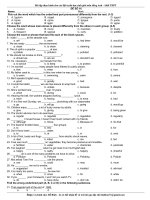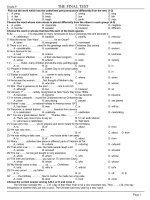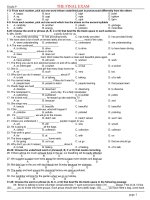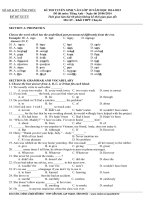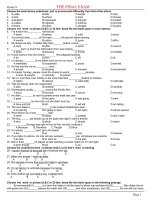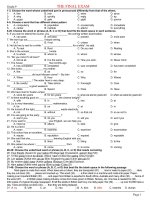Đề ôn thi vào 10 môn Anh (2019)
Bạn đang xem bản rút gọn của tài liệu. Xem và tải ngay bản đầy đủ của tài liệu tại đây (331.14 KB, 5 trang )
ĐỀ LUYỆN THI VÀO LỚP 10 MÔN: TIẾNG ANH – ĐỀ SỐ 1
Thời gian làm bài: 60 phút
Họ và tên thí sinh: …………………………………..
I.
Số báo danh: ……………………
MULTIPLE CHOICE (8.0 points)
Mark the letter A, B, C, D on your answer sheet to indicatethe word whose underlined part differs from
the other three in pronunctication in each of the following question:
Question 1:
A. talked
B. watched
C. lived
D. stopped
Question 2:
A. stream
B. leather
C. cream
D. dream
Mark the letter A, B, C, D on your answer sheet to indicate the word which differs from the other three in
the position of the primary stress in each of the following question:
Question 3:
A. permission
B. computer
C. million
D. perfection
Question 4:
A. cinema
B. position
C. family
D. popular
Mark the letter A, B, C, D on your answer sheet to indicate the underlined part that needs correction in
each of the following question:
Question 5: Nam hasn’t finished the work yet, and Ba hasn’t neither.
A
B
C
D
Question 6: Peter had already saw that musical before he read the reviews about it.
A
B
C
D
Question 7: They asked me what did happen last night, but I was unable to tell them.
A
B
C
D
Mark the letter A, B, C, or D on your answer sheet to indicate the correct answer to each of the following
question:
Question 8: If you had known he was ill, why ______ you ______ to see him?
A. didn’t / come
B. wouldn’t / come
C. hadn’t /come
D. would/come
Question 9: They ______ tired now because they ______ in the garden since 8 o’clock.
A. are/ worked
B. were/were working
C. are/have been working
D. were/worked
Question 10: I wish you..........................stop interrupting me whenever I speak.
A. did
B. would
C. might
D. will
Question 11: These houses.....................100 years ago.
A. are built
B. built
C. were built
D. build
Question 12: _______, the results couldn't be better.
A. No matter what he tried hard
B. No matter how hard he tried
C. Although very hard he tried
D. Despite how hard he tried
Question 13: Yoko feels .................. again after her illness but she still cannot work..............
A. strong/ hardly
B. strongly/ hard
C. strongly/ hardly
D. strong/ hard
Question 14: You should ……………your shoes when coming to a Japanese house.
A. Take off
B. put on
C. get off
D. take on
Question 15: I look forward ………………..you soon.
A. See
B. seeing
C. to see
D. to seeing
Question 16: It’s high time you ………….to study harder since last year, you had a very bad result.
A.will start
B. start
C. started
D. to start
Mark the letter A, B, C or D on your answer sheet to indicate the most suitable response to complete each
of the following exchanges:
Question 17: “Do you like watching the news, Thang?” – “ …………….. It’s very informative.”
A. No, I don’t
B. Yes, I do
C. Not really
D. Quite the opposite.
Question 18: “I have a terrible headache.” “ ___________”
A. Maybe I’m not going to the doctor’s.
B. Not very well. Thanks.
C. Maybe you should take a rest.
D. Not bad. I’m not going to the doctor’s
Mark the letter A, B, C or D on your answer sheet to indicate the word(s) CLOSET meaning to the
underlined word(s) in each of the following question:
Question 19: The boy was brought up with a family in the countryside.
A. grown
B. raised
C. set
D. born
Question 20: Let’s wait here for her. I’m sure she’ll turn up before long.
A. arrive
B. go
C. visit
D. enter
Mark the letter A, B, C or D on your answer sheet to indicate the word(s) OPPOSITE meaning to the
underlined word(s) in each of the following question:
Question 21: The music is what makes the movie memorable.
A. increadble
B. forgetable
C. remarkable
D. evenfull
Question 22: Although they hold similar polictical views, their religious belief present a striking constrast.
A. Complete concidence
B. minor comparison
B. Significant difference
D. intersting resemblance
Read the following passage and mark the letter A, B, C or D on your answer sheet to indicate the correct
word or phrase that best fits each of the numbered blanks:
FLOODS IN DORCHESTER
At six o’clock yesterday evening, the River Thames burst its banks and flooded a wide area. By nine o’clock
the floods had reached the town of Dorchester. The main street was soon under three feet of water. Water
engines arrived quickly to pump away the water, but heavy rain made their job very (23) _______.
Mrs. Rose Willow, a (24) _________ nearly 80 years old, and living alone in her cottage, was trapped
upstairs for three hours. (25) _____, rescue workers were able to rescue her with ladder and a small boat.
“My cat, Tibbles, stayed with me all the time,” said Mrs. Willow. “She helped me a lot. She sat with me, so I
didn’t feel afraid. ”
The rain has finally stopped, the river level is falling and the weather forecast is good, _____(26) the floods
have done a great deal of damage. “Luckily, nobody was drowned (die in water) or injured,” Chief Rescue
Office Hawkins told reporters, “but it will take a long time to _______ (27) the mess. ”
Question 23: A. easy
B. difficult
C. quick
D. lean
Question 24: A. girl
B. man
C. lady
D. child
Question 25: A. Finally
B. Final
C. Last
D. Firstly
Question 26. A. but
B. also
C. therefore
D. so
Question 27: A. clear
B. develop
C. take
D. fight
Read the following passage and mark the letter A, B, C or D on your answer sheet to indicate the correct
answer to each of the question:
These days, most people in Britain and the United States do not wear very formal clothes. But sometimes
it is important to wear the right thing.
Many British people don’t think about clothes very much. They just like to be comfortable. When they go
out to enjoy themselves, they can wear almost anything. At theaters, cinemas and concerts you can put on what
you like from elegant suits and dresses to jeans and sweaters. Anything goes, as long as you look clean and
tidy.
But in Britain, as well as the United States, men in offices usually wear suits and ties, and women wear
dresses and skirts (not trousers). Doctors, lawyers and business people wear quite formal clothes. And in some
hotels and restaurants men have to wear ties and women wear smart dresses.
In many years, Americans are more relaxed than British people, but they are more careful with their clothes.
At home, or on holidays, most Americans wear informal or sporty clothes. But when they go out in the evening,
they like to look elegant. In good hotels and restaurants, men have to wear jackets and ties, and women wear
pretty clothes and smart hairstyle.
It is difficult to say exactly what people wear informal or formal in Britain and the United State because
everyone is different. If you are not sure what to wear, watch what other people do and then do the same.
You’ll feel more relaxed if you don’t look too different from everyone else.
Question 28: Many British people wear freely when they _________.
A. meet their friend
B. attend lectures
C. attend meeting
D. spend their spare time
Question 29: Who doesn’t usually wear suits and ties?
A. Lawyers
B. Doctors
C. Farmers
D. Secretaries
Questio 30: If you visit an American friend at home in the evening, you may find that your friend wears
_________.
A. pretty clothes
B. informal clothes
C. formal clothes
D. dirty clothes
Question 31: If you are in foreign country, the best way the writer suggest to you is to wear _________.
A. strange clothes
B. as the people there do
C. your native clothes D. pretty clothes
Question 32: What do you think the passage is mainly about?
A. Recent dressing habit in Great Britain and the United States.
B. The reason why informal clothing is popular in Britain and US.
C. When we should wear in a formal way.
D. Where we should wear in a formal way.
II. WRITING (2.0 points)
Finish the sencond sentence so that it has similar meaning to the first one, beginning with the given word.
Question 33: She can't buy a new bike because she doesn't have enough money.
If she ……………………………………………………………………………………
Question 34: Ba said to Tung, “Would you like a cup of tea?”
Ba offered.........................................................................................................................
Question 35: It’s years since we visted our grandparents.
We haven’t ……………………………………………………………………………..
Question 36: "Do you go to school by bicycle?" he asked us.
He asked us ………………………………………………………………………………
Combine two sentences into a new one using the given word in the brackets. Do not change the given
words in any ways:
Question 37: The taxi driver was friendly. He took me to the airport.
…………………………………………………………………………………………. (WHO)
Question 38: They did their job well. They hoped the boss would increase their salary.
…………………………………………………………………………………………. (SO)
Question 39: The coffee was very bitter. My wife couldn't drink it.
…………………………………………………………………………………………. (TOO)
Question 40: I regret now. I didn’t pay much attention to the lecture.
…………………………………………………………………………………………. (WISH)
WRITING
Question 33: if she had enough money, she could buy a new bike.
Question 34: Ba offered Tung a cup of tea.
Question 35: We haven’t visited our grandparents for years.
Question 36: He asked us if we went to school by bicycle.
Question 37: The taxi driver who took me to the airport was friendly.
Question 38: They did their job well so that their boss would increase their salary.
Question 39: The coffee was too bitter for my wife to drink.
Question 40: I wish I had paid much attention to the lecture.




